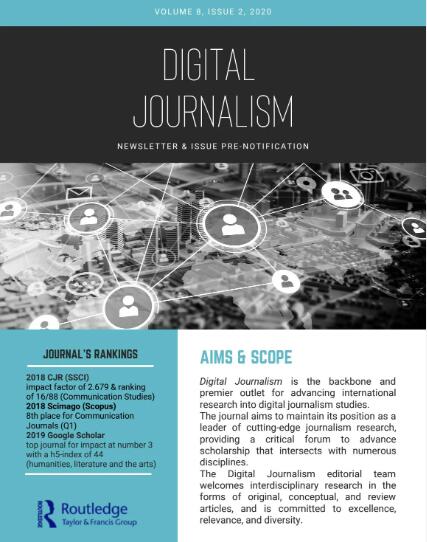你会说虚假信息吗?利用语言和风格特征计算检测类似欺骗性新闻的内容
IF 5.4
1区 文学
Q1 COMMUNICATION
引用次数: 0
摘要
随着人们对虚假或误导信息的扩散和相信的担忧与日俱增,这项研究探讨了在公共领域进行自动检测的必要性。该研究重新审视并复制了对虚假或误导性信息的检测。本文章由计算机程序翻译,如有差异,请以英文原文为准。
Do You Speak Disinformation? Computational Detection of Deceptive News-Like Content Using Linguistic and Stylistic Features
Amid growing concerns about the proliferation and belief in false or misleading information, the study addresses the need for automated detection in the public domain. It revisits and replicates sc...
求助全文
通过发布文献求助,成功后即可免费获取论文全文。
去求助
来源期刊

Digital Journalism
COMMUNICATION-
CiteScore
11.20
自引率
24.10%
发文量
103
期刊介绍:
Digital Journalism provides a critical forum for scholarly discussion, analysis and responses to the wide ranging implications of digital technologies, along with economic, political and cultural developments, for the practice and study of journalism. Radical shifts in journalism are changing every aspect of the production, content and reception of news; and at a dramatic pace which has transformed ‘new media’ into ‘legacy media’ in barely a decade. These crucial changes challenge traditional assumptions in journalism practice, scholarship and education, make definitional boundaries fluid and require reassessment of even the most fundamental questions such as "What is journalism?" and "Who is a journalist?" Digital Journalism pursues a significant and exciting editorial agenda including: Digital media and the future of journalism; Social media as sources and drivers of news; The changing ‘places’ and ‘spaces’ of news production and consumption in the context of digital media; News on the move and mobile telephony; The personalisation of news; Business models for funding digital journalism in the digital economy; Developments in data journalism and data visualisation; New research methods to analyse and explore digital journalism; Hyperlocalism and new understandings of community journalism; Changing relationships between journalists, sources and audiences; Citizen and participatory journalism; Machine written news and the automation of journalism; The history and evolution of online journalism; Changing journalism ethics in a digital setting; New challenges and directions for journalism education and training; Digital journalism, protest and democracy; Journalists’ changing role perceptions; Wikileaks and novel forms of investigative journalism.
 求助内容:
求助内容: 应助结果提醒方式:
应助结果提醒方式:


